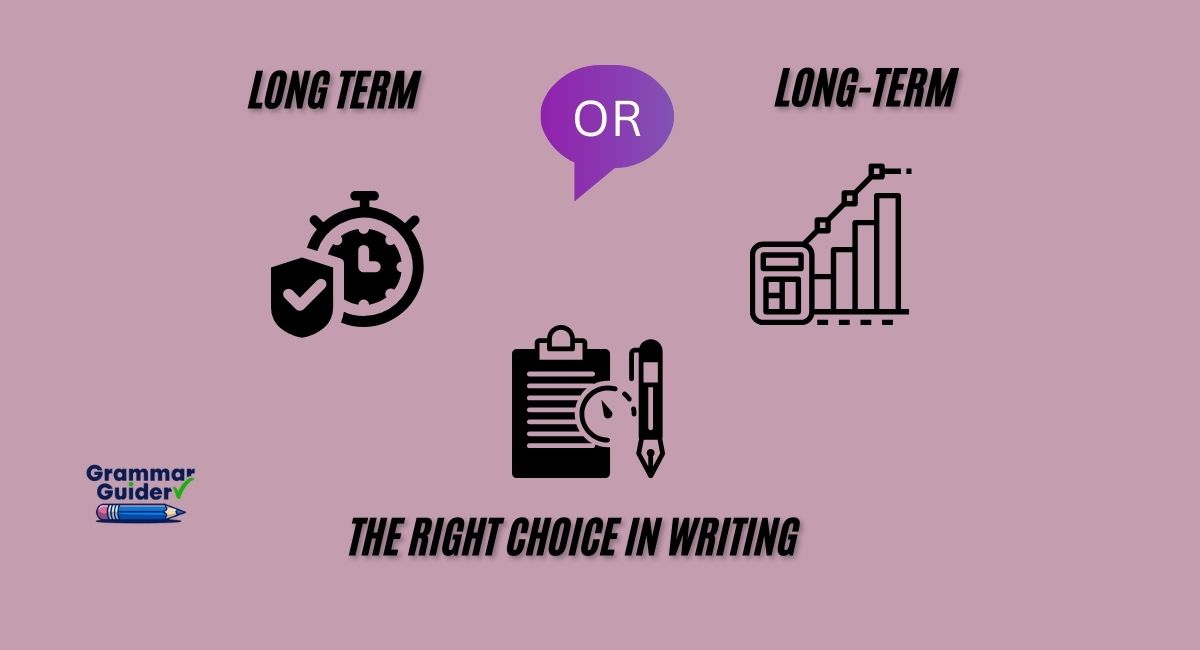“Long term” and “long-term” look similar, but each has its own job. “Long term” means a long time. People use it as a noun phrase, like in “planning for the long term.” It does not describe anything directly. It simply talks about a long period of time by itself.
“Long-term,” on the other hand, acts like a describing word or adjective. It explains something that lasts for a long period. For example “a long-term project” means a project that will take time. The hyphen between “long” and “term” helps us know it’s modifying another word.
Why is There Confusion?
Many people feel confused about using long term and long-term in writing. These two look similar but have different uses. Some use long-term because it’s more common, but long term is also correct. Each serves its own purpose, depending on how it fits in the sentence.
This confusion also comes from different grammar rules and writing styles. Some words like longtime don’t need a hyphen, making things even trickier. People might wonder if they should follow one rule or another. Understanding when to use each helps make sentences clear and easy to read.
What Does “Long Term” (with space) Mean?
“Long term” (with a space) refers to an extended period of time. It is often used as a noun phrase to describe something that happens over a long duration. For example, someone may plan for the long term by thinking about future goals instead of immediate results.
In writing, long term stands alone and shows that something will take a while. It is not used to modify another word. You might say, “He is focused on the long term,” to show that his thoughts are about the future. This helps make clear the time involved.
What Does “Long-Term” (hyphenated) Mean?
“Long-term” (with a hyphen) describes something that lasts for a long time. It acts as an adjective to explain things that happen over an extended period. For example, in “a long-term project,” the hyphen shows that “long-term” is one word, making it clear that it describes the project.
Using “long-term” with a hyphen helps make writing clear. The hyphen tells readers that both words together describe a time-related idea. You can see “long-term” in phrases like “long-term goals” or “long-term effects.” This form is very helpful in writing, especially for showing the importance of future planning.
The term “longterm” (without a space or hyphen) is not correct in standard English. It might appear in casual writing, but it is not accepted in dictionaries. The right choices are “long term” (as a noun phrase) and “long-term” (as an adjective). Using “longterm” can cause confusion.
“Long Term” vs “Long-Term”: The Differences
- “Long term” is used as a noun phrase to refer to an extended period of time. It talks about something that happens or lasts for a long duration, like future plans or goals.
- “Long-term” is an adjective that describes something that lasts for a long time. It modifies a noun and shows that the noun involves a long duration such as a long-term investment.
“Long Term” as a Noun Phrase
It is a noun phrase used to talk about a long period of time. It refers to things that happen or exist for many years or months.
- For example, “She is planning for the long term with her savings.”
In this sentence, “long term” shows the period over which the person plans. It helps explain that the plans will last for a long time. You can also say, “We need to think about the long term for the environment.”
Read This Blog: What is the Plural of Chief? Chiefs or Chieves?
“Long-Term” as an Adjective
“Long-term” is an adjective that describes something lasting for a long time. For example, “She made a long-term plan to save money.” Here, “long-term” tells us the plan will last for many years.
You can use “long-term” to describe things like goals or changes that take a lot of time. For instance, “He wants to make long-term improvements in his health.” This shows that the improvements will take a long time to happen.
| Aspect | “Long Term” (with space) | “Long-Term” (hyphenated) |
|---|---|---|
| Grammatical Function | Noun phrase | Adjective |
| Usage | Talks about a period of time. | Describes something lasting a long time. |
| Example Sentence | “He is focused on the long term.” | “They made a long-term plan.” |
| Position in Sentence | Stands alone or follows a verb. | Comes before a noun it describes. |
| Hyphenation | No hyphen | Requires a hyphen |
Synonyms For “Long Term” and “Long-Term”
There are many synonyms for “long term” and “long-term” that can make writing more interesting. For example, “long term” can also be called extended period, long haul, or distant future, while “long-term” can be replaced by prolonged, lasting, or sustained.
Synonyms for “Long Term” (Noun Phrase)
- Extended period
- Long haul
- Distant future
- Lengthy duration
- Prolonged period
- Long-range
Synonyms for “Long-Term” (Adjective)
- Prolonged
- Enduring
- Lasting
- Extended
- Sustained
- Chronic
- Ongoing
Examples in Context
Here are some examples to help you understand how to use “long term” and “long-term” in sentences. These examples show how we use “long term” for a period of time and “long-term” to describe something lasting a long time.
Examples Using “Long Term” (Noun Phrase)
- She is thinking about the long term when planning her savings.
- The company wants to grow in the long term, not just for quick profits.
- Their relationship is built on trust for the long term.
- He is focused on the long term when making big decisions.
- We need to plan for the long term to have a successful future.
Examples Using “Long-Term” (Adjective)
- Long-term is used to describe something that lasts for a long period.
- It works as an adjective to describe things like plans or goals.
- For example, in the sentence “They have long-term goals” it shows the goals last for a long time.
- We say “long-term” when we want to talk about things that take a while to happen or finish.
- “Long-term” describes things that are not quick or short like a long-term project.
Origins of “Long Term” and “Long-Term”
The word “long term” comes from old English. It means a long period of time. It started as two separate words and was used to talk about things that take many years. Over time, people began using it to refer to goals and plans that last a long time.
The word “long-term” started in 1876. It was used as an adjective in insurance. The hyphen joined the words to show that they worked together. It describes things that last a long time. The use of a hyphen makes it clear that “long-term” is a compound adjective.
FAQ’s
What is the difference between “long term” and “long-term”?
“Long term” is a noun phrase. It talks about a long period of time. “Long-term” is an adjective. It describes something that lasts for a long time.
When do we use “long term”?
Use “long term” when you talk about time alone. It does not modify another word.
When do we use “long-term”?
Use “long-term” when you are describing something that lasts for a long time, like a long-term goal or long-term plans.
Can I use “longterm” without a space or hyphen?
No, “longterm” is not correct. Use “long term” or “long-term” depending on how you use it in the sentence.
Why is the hyphen important in “long-term”?
The hyphen shows that “long-term” is an adjective. It helps the words work together to describe something.
Can “long term” be used as an adjective?
No, “long term” is only a noun phrase. Use “long-term” when you need an adjective.
Conclusion
Choosing between “long term” and “long-term” depends on how you use them in a sentence. If you are talking about a period of time, like in “the long term”, use “long term” as a noun phrase. It stands alone and refers to something that lasts for a long time.
On the other hand, when you want to describe something that lasts over a long period, like in “long-term goals”, use “long-term” with a hyphen. This makes it a compound adjective, which modifies a noun. Knowing the difference helps make your writing clearer. Always be careful with your choice to avoid confusion and improve your writing clarity.

Jacob Harrison is the seasoned writer behind Grammar Insights, with over nine years of experience in the field. Passionate about language, he shares practical tips and strategies to help readers enhance their grammar and writing skills. With a friendly approach, Jacob makes learning accessible and enjoyable for everyone.

